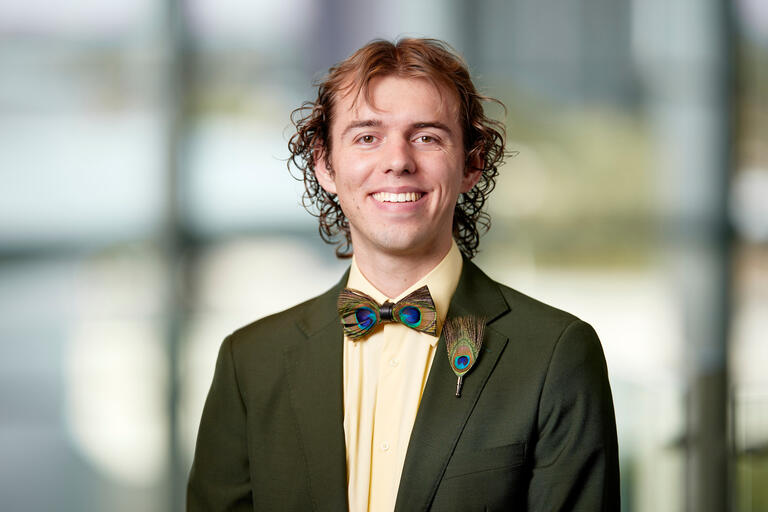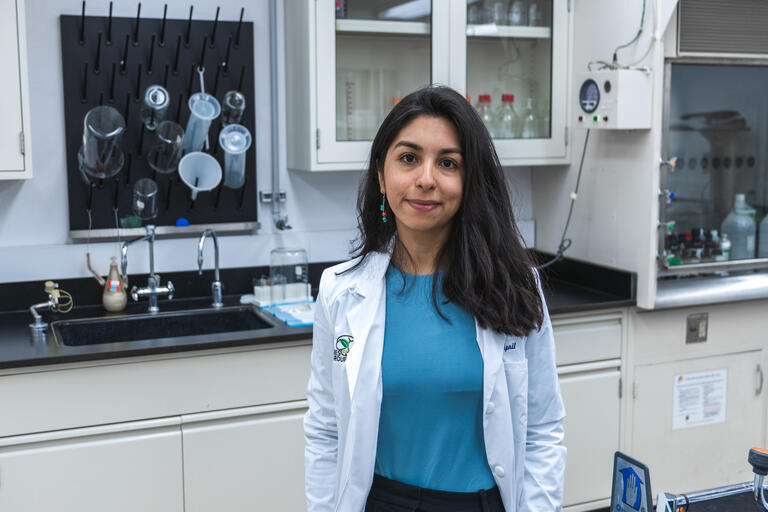You might say Debbie Pattni, ’06 MBA & Hotel Management and ’16 MEd Higher Education, was an advisor-in-training during her 22 years as a stay-at-home mom and community volunteer. She routinely did research and sent her three children to their high school counselors and UNLV advisors with detailed lists of questions. Before long, she was helping their friends get admitted, find scholarships, and select classes at UNLV.
Joining the academic advising world full time in 2016 — first at the Academic Success Center (ASC) and today as retention, progression & completion coordinator in the College of Liberal Arts’ Wilson Advising Center — seemed to be the natural next step. Now the award-winning advisor guides other people’s children, particularly those who may be struggling personally or academically, to the resources they need to “hang in there”’ and graduate.
Who did you look up to in your field when you first started?
I didn’t get hired right away. I applied for over a year after completing my MBA and hotel degrees. I thought those two colleges would hire me, but I never heard back. I did a little research and found that many academic advisors had the master of higher education degree, so I pursued that.
I ended up talking to Dr. Anne White in the ASC. She was in charge of coaching at the time, which I’d never heard of. I interviewed with her. She said, “You need some practical experience. Even with all your education, you don’t have any professional experience working with students.” She hired me at 52, which was pretty old to start being an academic success coach graduate assistant. I really appreciated that because I could see that she believed it wasn’t an age thing; it’s a caring thing. After that, I always looked up to her for getting me on the right path. The first person who helps you is the one you feel most indebted to.
Tell us about a lesson you learned from a student.
It’s not just one lesson. I’m learning from their experiences. I’ve learned that they are not looking for excuses for why they are not doing well. They’re telling me, “I want to take more classes in the summer because I realize I’m not going to get anywhere without my degree” or they’re telling me how determined they are, how they’re going to use their stimulus money to take summer classes. They are really determined. I’ve learned a lot about their resilience and their adaptability. They just want someone to understand what they are going through.
Tell us more about your role and how it differs from that of an advisor.
It is an advisor. I have the privilege of doing this full time in this college. I report to the director, and I’m also a direct line to the office of Dr. (Laurel) Pritchard (vice provost for undergraduate education.) The university funded these roles to watch over UNLV’s retention, progression, and completion initiatives. I run the graduation applications for every semester and make sure those are getting done. I make sure students know what to do and what classes to take. I also work with students on probation, returning from suspension, readmitted or non-degree seeking students — all those who may be failing or having trouble. I also help with the scholarships from the dean’s office. It’s really an advisor that has time to look out for all those initiatives. I’ve been allowed to develop the role. I only advise 50 percent of the time. It varies with my administrative duties.
What’s your biggest pet peeve at work or in life?
I think it’s in life because work is such a positive place. It’s the environment of division that’s been created that isn’t really real. If you listen to the news, it sounds like (the university is) headed for disaster, nobody cares about higher ed, and everyone’s going to drop out. Then you come on campus and meet with students, and they don’t care about that stuff at all. They just want to get their degrees; they want to have a good life and career, especially our first-gen and DACA students. It’s just such a false representation, especially at UNLV. There’ll always be a few people who aren’t doing good things, but it’s just so unreal. I think people can get the wrong message. The students aren’t that upset about being online like you read in the news. They’re not just going to abandon their dreams of getting their degrees. Re-enrollment is going to be strong; it already is. I tracked the numbers. We’re already almost where we were last year, and we haven’t even started outreach yet. Students are just really focused on what they need to do so that when things get better, they’re where they need to be.
What is something people would be surprised to learn about you?
What surprises students is that I’m Mexican American and fluent in Spanish. I use it a lot with our first-generation students that come by in the fall. They usually bring parents in. It’s common if they don’t speak English that they are translating through the student, and I just talk to them directly. That shocks them, I guess, because I get told a lot that I don’t look Mexican. (One of) my undergraduate degrees was in Latin American studies (the other, business administration/marketing; both from University of the Pacific).
I think another thing that shocks a lot of people is that we really care about them. They’ll say, “I asked you this last time; I don’t want to bother you.” But that’s what we’re here for. We’re being paid because we care about our students and we get to help them understand how the policies benefit them. They don’t often expect that.
Have you ever taken a personality test and what did you think of the results?
Yeah, because it’s required in every master’s program. It’s changed over the years. When I did the Myers-Briggs one, I was the introvert. I was the person who would rather work in the closet with accounting, a computer, no people contact all day because people just got in my way of getting work done. I was very much that way in all my previous life. In my career before I got married, I did accounts payable and construction contract administration. Before that, I was a project manager for multiple defense projects.
Then, of course, you have children and your life changes. When I came into higher ed, I became the extrovert. When it comes to teams in higher ed, I learned how much better it is to have people with different skill sets. And even though it delays the project and it comes out differently than you thought, it ends up being better for the students. Some 30 years later, I’m a completely different person.
Any mishaps related to working from home?
I’ve had to change everything. I moved into my son’s old bedroom for my office. I’m at his little kid desk, and I was getting backaches like crazy from this little screen. My husband bought me a stand for my laptop to raise it up, and then I got my keyboard from the office. I still wasn’t able to see much because of this little screen. For Mother’s Day, my husband bought me a new monitor. Now I have dual screens. My husband’s an engineer; he’s really good with IT. I was having trouble with my internet. He cleaned off my whole system and added new software. I just tell my IT director, and he just fixes it all. Now I have this nice setup that’s almost better than my office. Now I’m so productive, I just kind of prefer to work at home.
What do you miss most about campus?
The energy on campus, all the funny things students do. The Wilson Advising Center is right in the middle of the big grassy area filled with all the Student Union activity. You can see them out there standing on their heads, drawing on their Art 101 boards. You can see them out there with rallies, all kinds of stuff that just reminds you that you’re in an undergraduate environment. I miss seeing the students interacting. It’s the culture. I know when we go back to campus, we won’t see that because that’s what we need to stay away from for a while. We’ll miss that for a while. But I do talk to students a lot. Advisors are lucky; we get a lot of student interaction.
Binge-worthy recommendations?
One is Madam Secretary. I love it, and another is West Wing. It’s got so many seasons, it’ll keep me busy for a while. These shows are what politics could be. Maybe it’s my coping mechanism. I stopped watching the news completely. I only read the news now without all the extra interference from the other stuff. Before that, I didn’t watch a lot of TV. And I have been reading an entire series of middle school books I bought my kids — Anne of Green Gables, A Tree Grows in Brooklyn, the Wrinkle in Time series, and about 25 other books on my Kindle.
Best tip for staying cool in the summer?
We got new air conditioners in our house anticipating being home all summer. That’s what we do in Las Vegas in the summer — stay inside, stay in the A/C, jump in the pool. In the winter, we go to Mexico.



